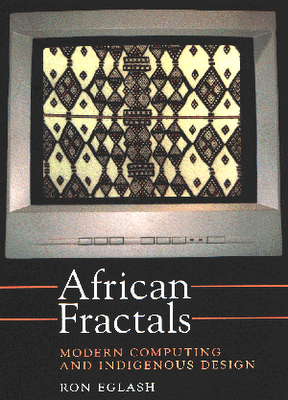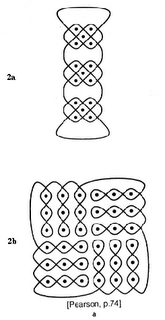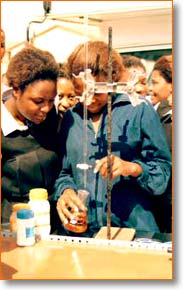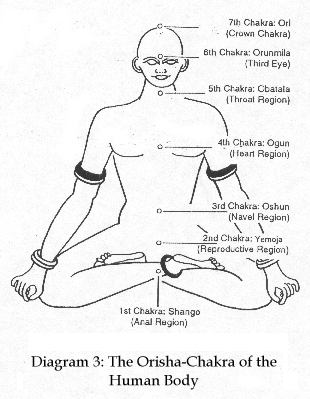
Africa’s Science & Technology Education: “Walking On Two Legs”
Into the New Millennium
Into the New Millennium
S. E. Anderson
Abstract:
In order to bring the peoples of Africa out of perpetual underdevelopment and stifling dependency, Africa’s societies need to embark on a 20-year plan to have a population of young people who are grounded in all current and cutting edge the science, math and technological knowledge available. In addition, this particular knowledge will be counterbalanced with those very same young people being knowledgeable about Africa’s multi-millennia relationship with mathematics, science and technology. They will work on developmental projects that will consciously link contemporary science & tech with Africa’s vast reservoir of traditions in math, science and technology and apply their projects to specific community needs. But, for all this to successfully happen Africa’s math, science an
(for samples of African Fractals, visit:
zzzzzzzzzzzzzzzzzzzzzzz
When one looks at Africa’s current and vast education systems, we see that they are is inextricably bound up with Western Education in the deformed and retarded form of “Education for Underdevelopment.” This process of underdevelopment manifest itself thru an ahistorical view of science, technology and mathematics that deliberately leaves Africa and its peoples out of evolution of humanity’s science, technology and mathematics. This process of intellectual, economic, social and spiritual oppression and repression is passed off by the powers that be as “products of developing societies.” As a result, our remo
In order to bring the peoples of Africa out of this perpetual underdevelopment and stifling dependency, Africa’s societies need to embark on a 20-year plan to have a population of young people who are grounded in all current and cutting edge the science, math and technological knowledge available.
In addition, this particular knowledge will be counterbalanced with those very same young people being knowledgeable about Africa’s multi-millennia

But, for all this to successfully happen Africa’s math, science, engineering and technology education curriculum and pedagogy must break from its constricting Western-centered moorings. For the past 200 years, Africa’s educational systems- without exceptions –have been either poor carbon copies of Western education systems or vague shadows of African and Muslim traditional educational systems. This, in turn, has helped to make the peoples of Africa the most dependent folk on Western scientific and technological knowledge while simultaneously being the least knowledgeable of today’s science & technology. (images are of Lusona Math out of Angola by way of Mozambique)
All one has to do is to go into any of Africa’s schools- be it elementary or university –and see that the books, curriculum and pedagogy is of Western origin. No history of science and math out of Africa. No references to technological traditions in architecture, mining, metallurgy, agriculture, medicine, transportation, etc. This means that we have for three generations created postcolonial societies where our youth were some of the most ignorant of- yet dependent upon – the West’s for-profit science & technology. These three generations have very little or no knowledge of the African presence in the developing of science & technology as well as current African contributions (as sparse as they may be).
In the new Millennium, national development and growth at the level of ordinary African is of central importance. However, at this moment ALL of

These negatives are part of the reality of the current relentless pillaging of Africa’s resources… part of the reason why Africa (and its Diaspora) has some of most unhealthy people on the planet.
We have come to a point where Africa faces multiple crises that its present educational system is designed to only feed these crises.
I am proposing that thru the African Union, African universities and primary school systems, Historically Black Colleges in the US and UNESCO as well as concerned wealthy citizens (preferably of African Descent) join forces and develop a 20-year Science & Tech Education Plan (SaTEP) that develops the necessary comprehensive elementary/secondary/university science, math & technology curriculum, the teacher-training component as well as the texts for all levels.
SaTEP- at its very foundation –would be structured in such a way that it would develop an African Science & technology education system that (as the Chinese spoke of during Mao’s time) “walks on two legs:” one leg in the present/future knowledge/practice and one leg in the traditions of the past knowledge/practice.
SaTEP will not ignore aspects of Western/Eastern education. It will determine what are the best aspects NOT based on the notion of “catching up”, but on the notion that Africa and its people have dire needs to first reverse the underdevelopment and mounting ignorance, then start in on Africa’s and its peoples’ advancement of not only the Continent, but the world. For it is in Africa that Humanity originated… and it is in Africa that Humanity and the Earth can be saved from the impending environmental holocaust resulting from 500 years of capitalist raping of Mother Earth.

What would a libratory science and technology education system look like for all of Africa?
• It would mesh traditional sciences and mathematics with some of the best science education techniques and curriculum forun in the West—such as The Algebra Project www.algebra.org and works found in Rethinking Schools
• It would utilize the latest in internet and computer software developments to encourage the creation of a Pan African Internet & Software Technology Institute that taps into not only what exist in Africa and elsewhere, but consciously and systematically recruit and nurture young Africans to become the leaders in these fields.
• Hence, Distance Learning techniques will be integrated into the traditional face-to-face ways of learning. All Distance Learners at some point during their school year will gather and work together for at least a two-week intensive.
• This also implies that thru the AU or UNESCO or a combination of collaborations, every African child will have a self-powered computer that will be wirelessly linked to the internet. See: <> for more details.
• SaTEP will have an African Traditional Science, Math & Technology Research Dept. (ATSMTResearch) that will seek out all the relevant traditions and knowledge bases documenting the rich and complex contributions Africans made to science, math and technology. (ATSMTResearch) will work closely with the curricula development and pedagogy people within SaTEP to help in the integrating of traditional knowledge with the contemporary.
• SaTEP’s immediate education strategic emphasis will be placed on “Education for Development & Self Determination”:
(a) developing ways to arrest and cure AIDS and other diseases currently ravaging the Continent and Diaspora;
(b) more generally, developing a new Continental FREE healthcare system grounded in a synthesis of contemporary and traditional medical practices;
(c) revitalizing & advancing the traditional food and nutrition structures;
(d) building solar, wind, water/wave, geothermal energy systems;
(e) arresting and reversing the myriad of ecological disasters unfolding all over Africa;
(f) building inexpensive housing based on the synthesis of the traditional with the eco-friendly concepts of the present;
(g) building a Continental Communications Infrastructure that links Africa to the World but not dependent upon the whims of Global capitalism;
(h) building a transcontinental road/rail/air transport; system that respects nature and peoples’ traditions;
(i) creating Africa’s first environmentally sound cars, trucks and buses (i.e. electric, steam/hydro, biofuel);
This means that African Science & technology education will be focused on helping research and development of all those things necessary to rebuild societies, people’s lives and the environmental and ecological systems of Africa.
SaTEP will NOT be concerned with the profit-maximization needs of global corporations. SaTEP will put African people and Mother Nature before profits.
More than 40 years ago, Revolutionary PanAfricanist, Frantz Fanon, said, “Each generation out of relative obscurity must discover its mission, fulfill it or betray it.”
This generation of Africans- and their children’s children -have the biggest burden of all: saving Humanity and Mother Earth from the unbridled ravagings of late imperialism and white supremacy. Science out of Africa of Yesterday, Today and Tomorrow is key.
Our duty is to help Africa’s Children to fulfill this mission.
A Multicultural approach to the science must be, at its base, antiracist. This means that it has to address the following:
o The historical roots that undergird the normalcy of racism.
o Contemporary Racism’s direct impact on “distancing” Science and Technology from people of color.
o The systematic devaluation or trivialization of non-Western cultures.
o The concepts of development and underdevelopment in relation to social and economic needs of a people or nation.
In developing the learning material needed for this multicultural approach to the Sciences we to consider:
o The linkage between social context and curriculum content.
o Highlighting the advantages of interdisciplinary approaches to the teaching of the science.
o The necessity of developing learning materials and classroom strategies, which encourage collaborative and individualized learning as well as small group work (3 to 5 people).
o A critique of the present school setup with particular emphasis on the way the Science are typically taught and the hierarchical way classroom learning is presently structured.
o A critique of the language of a textbook that normally renders science knowledge in accessible to students and affirms the dominant ideologies of racism, sexism and social class.
Science content
Science From Many People
For Grades 11 & 12
A) What is Science?
1. - Who does science today and why?
2. - What is science’s place in Society, Economics, and Culture?
B) What are the historical origins of Science?
1. - Science out of Africa: Early Humanity and “science”
2. - Early science and religion: Trying to understand the unknown
3. - out of AL-Kemet: The Non European Contribulations to science
4. - The split: Science, Capital and European Christianity
5. - Science-For-Profit: The Evolution of Science as we know it today
C) Details of Multicultural science History?
1. - Science in Africa from early humanity (3,000,000BC) to 1442
2. - Science in India up until British Colonialism (18th Century)
3. – Science in China
4. - Science in the Americans up until 1492
5. – Science in Australia/Maori (New Zealand) and the South Pacific
D) The impact of nonEuropean Science upon European Science
1. – Stolen Legacies: Theft of Ideas
2. - Understanding the Science Acculturation Process
E) Science Contribulations made by people of color to Science
1. – Slave and Free Black Contributions
2. - Colonial Era Contributions
3. – 20th/21st Century Contributions
Each student is required to do a team paper (typed) on some aspect of achievement Science: individuals, analysis and description of some scientific achievement…Each student will participate in a class trip at the beginning of the course. This trip will either entail going to a science museum or convention or laboratory (corporate or university), park, zoo or factory. This will be the anchor for the entire fundamental questions raise above.
Each student is requiring doing a book report (no more than two type written pages) on some subject within Multicultural Science. This will also be presented orally. This Science sections of international and nation nespapers will be required reading/discussing. This helps in placing the advances and language of science in its proper social/cultural context.
Every attempt should be made to get Scientists/engineers of color to come and talk to the classes. A videotape project could be organized by the students to go out an interview these folk on their job.
Science From Many People
A One Semester Course For Grades 11 & 12 & College Freshman
15-Week Overview
Fall
Week 1
a) General introduction to course and museum/ filed trip
b) Why do we study Science?
c) Who does Science today and why?
d) What is science’s place in the 21st Century Society, Economics, and Culture?
Week 2 What Are The Historical Origins of Science?
a) Science Out of Africa: Early Humanity and “Science”
b) The development of Agricultural techniques: the science of cultivation and animal husbandry
c) Africa Women, the physiology of pregnancy and childbirth and hierology
d) From stargazing to menstruation to astronomy/astrology
Week 3 Egypt’s Scientific and Technological Gifts to the World
a) The inclined plane
b) Gravity
c) Buoyancy/the technique of flotation
d) The power and natural significance of the “Golden Ratio”
e) The techniques of massive construction
f) Architecture
g) Surgery and other medical sciences
h) Highly accurate astronomical techniques
i) Land surveying
First Report back on Class Wide World science project
Week 4 Navigation and sophisticated large shipbuilding techniques
j) Mining technique
k) City planning
l) Agricultural sciences
m) Weaponry, the martial arts and military science
n) Various mathematical concepts and techniques
Week 5 The Babylonian, Phoenician and Pre-Islamic Scientific Contribution
a) The Egyptian connection to early Middle Eastern scientific and technology
Development.
b) Summary of the Contribution
c) The Middle East as center of science cross-fertilization between Africa, Asia and Europe (Greece)
Week6&7 Ancient India and China’s Science & Technology
a) The inclined plane
b) Gravity
c) Buoyancy/the technique of flotation
d) The power and natural significance of the “Golden Ratio”
e) The techniques of massive construction
f) Architecture
g) Surgery and other medical sciences
h) Highly accurate astronomical techniques
i) Land surveying
Second Report back on Class wide World Science project
Week7&8 Indiana and Chinese Science cont’d
j) Navigation and sophisticated large shipbuilding techniques
k) Mining techniques
l) City Planning
m) Agricultural sciences
n) Weaponry, the martial arts and military science
o) Various mathematic concepts and techniques
Week 9 Science out of the Americas, Australia and the Pacific Islanders
a) The Africa and Asian Connection: Tracing Roots
b) The Importance of Pre-Columbian visits to the Americans and the pacific Islands by Africans and Asians
c) Great Agricultural Skills
d) Great and Unique Navigational Skills
Week 10 Science and Religion: A Comparative Analysis
a) Does science have to be antagonistic towards religion and vice versa?
b) Pre-Christian Era Science: a time of Spiritual Compatibility. Why?
Capitalism, Superstition, Old Wives Tales and Science Fiction: From Metaphysics to Physics: Creating the mystique of Western Science
c) The Split: Science, Capital and European Christianity
Third report-back on Class-wide World-Science project
Week 11 The Moors and Arab Science: Precursors to European Science
a) Who were the Moors?
b) The Arab World: 700AD to 1492
c) Science is encouraged by Islam
d) Great Scientific and Technological Achievements during the so-called “Dark” Ages (Medieval Period)
e) What science, Math and technology the Moors brought to the European continent
Week 12 Science-For-Profit: the Evolution of Western Science Because of the Destruction of Non Western Science
a) The impact of Non-European Science upon the development of European Science
b) Capital and Science- the evolution of interdependency in Europe
c) Slavery and the creation of “Race” as a pseudoscientific Concept
d) Slavery and the evolution of Hydrodynamics, Weapons Science and Cash-crop Agriculture
Week13 Science and the Third World Today: Towards a World science
a) Ecology, Environmental Racism and the struggle to reclaim Mother Earth
b) Alternative and “appropriate “technologies in Africa, Asia & Latin America: Towards Self reliance
c) Computers, information technology and the Third World-liberating
Or further Dependency?
d) A look at the positive contributions to science and technology by people of color in the 20th Century
e) Western Science finally (but reluctantly) coming around to a holistic understanding
Week14-15 Consolidating the science projects, working on the video documentary, researching for individual student paper attending college and community seminars relating to multicultural science. The teacher(s) works as a mentor advising and guiding the research teams and individual students. Students finalize their work for the public presentation of the class –wide Science project or exhibit.
Last Week: What can we learn from Multicultural Science? A Summation.
============================
Suggested Reading List
Theoretical Works (primarily for teacher, but not exclusively)
African Fractals- Ron Eglash. Rutgers University Press
Multiculturalism in mathematics, Science and Technology: Readings and Activities (with Wall Chart)-Thom Alcoze, et. Al.Addison-Wesley, Boston: 1992
Multicultural Mathematics- David Nelson, et.al.Oxford University Press, New York: 1993
Antiracist Science Teaching- Dawn Gill & Les Levi Dow. Free Association Books, London 1987
The “Racial” Economy of Science- Sandra Harding. Indiana University Press, Bloomington: 1993
The Crest Of The Peacock: Non-European Roots Of Mathematics- George Joseph. Penguin, New York. 1992
Multicultural Math Posters- Key Curriculum Press: Box 2304, Berkeley, CA 94702-9983
Nurturing At-Risk Students in Math & Science- Randolf Tobias. National Educational Service, Bloomington: 1992
Journal Of Negro Education, Vol. 59. No. 3 (1990): Special Issue an Mathematics and Students of color